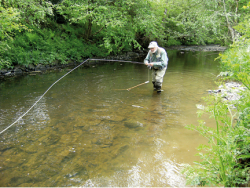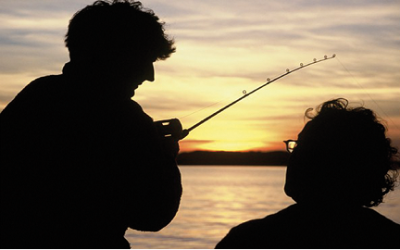The Westcountry Rivers Trust is an environmental charity, established in 1995 to secure the preservation, protection, development and improvement of the rivers and streams in the Westcountry, and advance the education of the public in the management of water.
The Trust was formed by a group of passionate conservationists who recognised that the integrity of our rivers and their fisheries was diminishing. This group carefully chose a range of strategically important partners who helped develop the initial modus operandi, provided technical back-up, and promoted the importance of the Ecosystem Approach. The partners also, importantly, helped develop a dedicated agricultural team which allowed the Trust to offer win-win solutions to long term problems, resulting in environmental gain and economic benefit for the farmer. Over the next few years, the Trust delivered its first major project, Tamar 2000 which is still held up today as the pathfinder for what many regard as the best solution for dealing with diffuse pollution.
Since then, the Trust has evolved and moved on, though staying at all times true to its philosophy of “Think Global, Act Local”. Over the decade it has been in existence, the Trust has worked closely with over 2000 farmers and landowners across nearly 20 Westcountry catchments and has delivered many social, economic and environmental outputs including: 1400+ Integrated Land & River Management Plans; over 250 miles of river restored; 200 km+ vulnerable riverbank restored; 20+ wetlands restored; 100+ buffer zones created; 400+ sites of accelerated erosion controlled and 35 demonstration sites developed and operational.
The Trust continues to deliver strategic fisheries projects in partnership with the Environment Agency, Natural England, South West Rivers Association, AONB’s, National Parks, land managers and angling clubs and associations. The team carry out a wide range of work including: river habitat and fish population surveys; addressing migratory barriers; instream habitat improvement such as gravel cleaning; bankside habitat restoration and protection through fencing and coppicing; and enhancing salmonid spawning and juvenile habitats in impacted river reaches. In recent years, the WRT has also been involved with a number of EU partnerships which have helped develop new and innovative approaches to address the decline in European eel, develop sustainable angling tourism management, as well as the groundbreaking Atlantic Salmon Arc Project, which developed a genetic database of salmon from Portugal to Scotland in order to improve the management of sea net fisheries for conservation of stocks and abundance.
The ‘Westcountry Angling Passport’
On the back of WRT’s early catchment restoration projects, an angling marketing initiative, called Angling 2000, was launched in order to deliver two main ambitions - the first was to provide anglers with a wide choice of reasonably priced wild fishing in fantastic Westcountry surroundings and the second was to provide farmers and riparian owners with an income to protect and enhance these watery delights.
This angling initiative has been a huge success and the Westcountry Angling Passport now builds on this success whilst expanding the range of angling opportunities in the region. Whether you enjoy stream, river or lake fishing there is a vast choice of excellent fishing to choose from and all set within a unique and beautiful natural environment. Anglers using the Westcountry Angling Passport can also feel good in the knowledge that revenue generated through their fishing goes back into managing these rivers for the benefit of our fish stocks and future generations.

Two exciting ways to go fishing...
The Westcountry Angling Passport is operated on a ‘token’ and ‘bookable day-ticket’ basis. The Token System is a sheer delight for the roving angler; instead of having to buy a separate ticket for each participating fishery, anglers can buy a book of tokens which gives them access to any of the fisheries, when they want and without the need to contact anyone beforehand. Anglers simply buy a book of tokens, use the angling brochure or website to decide which of the fisheries they want to go to, and hey presto - get fishing!
Angling tokens cost £2.50 each and come in three parts - the first part is posted in a marked letterbox located close to the fishery, at the start of the day’s fishing. The second part is a catch return to be posted in the same letterbox at the end of the day’s fishing and the final part is the angler’s record. The fisheries are rated according to their quality, ‘fishability’ and species of fish. Fishing costs range from 2 to 5 tokens a day (£5 to £12.50) making it extremely good value fishing! The tokens are supplied as books of either 5 or 10 and are available for use over a fishing season.
For those wishing to try their luck at some of the finest stillwaters in the country, the angling tokens can be redeemed against a day’s fishing at the following South West Lakes Trust, trout fisheries; Kennick, Wimbleball, Siblyback, Stithians, Wistlandpound, Roadford, Colliford and Fernworthy. Whether you enjoy bank or boat fishing, are a novice or seasoned angler, prefer stocked or wild fisheries, these lakes provide fantastic sport in some of the region’s most beautiful surroundings.
The Booking Office is an exciting development through which anglers can reserve fishing for salmon, sea trout, brown trout and grayling on some the region's finest rivers. Anglers can use the website or information sheets to view these fisheries and bookings can be made via our ‘online service’ or by calling the office. Once a booking has been made, the angler will automatically receive maps & directions by email or post. We can also advise on local guides who can help you unlock the secrets to having successful day out on the river, point you in the direction of local hotels or B&B accommodation as well as providing other help and advice to make your trip as memorable an experience as possible.
If you are an angler or fishery owner who would like to know more about the Westcountry Angling Passport or would like to be a part of it, we would like to hear from you.
Making the most out of angling for the region...
The Trust is part of a new partnership project, Collabor8, which has been awarded funding from the EU Interreg 4B North West Europe programme. WRT will be developing and expanding the Westcountry Angling Passport as a sustainable, regional, angling development and marketing scheme as well as seeking, with SW Tourism and partners, to develop clusters of angling providers and associated rural businesses in order to facilitate rural tourism. The Trust will also be working closely with a number of public and private sector organisations including the Environment Agency, South West Lakes Trust, South West Regional Development Agency and Get Hooked to maximize the success of the project and promote the region widely.

The Interreg 4B programme helps organisations from across Europe to work in partnership on common projects, learn from each other’s experiences and then put those lessons into practice. The Collabor8 project links nine initiatives from across NW Europe. The partners involved alongside WRT include Brecon Beacons National Park Authority, Merthyr Tydfil County Borough Council and South Downs Joint Committee from the UK, together with partners from Ireland, Belgium and the Netherlands.
As part of Collabor8 we will be working closely with accommodation providers, pubs, restaurants, local food producers and other rural businesses who would like to forge greater links to angling as a means of developing their businesses and increasing profitability. So if there are any businesses who would like to discuss these opportunities please get in touch with us.
To sign up to the Westcountry Angling Passport and receive a free angling brochure detailing Token and Booking Office fisheries or to Book your day tickets / purchase Tokens please go to www.westcountryangling.com Alternatively you can telephone or call in to the Trust office in Stoke Climsland (9am - 5pm). Angling brochures and Tokens are also available from a number of registered outlets in Devon and Cornwall (see website or brochure for details).
Contact details for the Trust:
www.wrt.org.uk
Dr Dylan Bright - Director
Westcountry Rivers Trust, Rain-Charm House, Kyl Cober Parc, Stoke Climsland, Callington, Cornwall PL17 8PH. Tel: 01579 372140
Email: [email protected]
Contact details for the Westcountry Angling Passport:
www.westcountryangling.com
and for angling enquiries please email:
[email protected]
Toby Russell at the Westcountry Rivers Trust.
Tel: 01579 372145
Email: [email protected]






